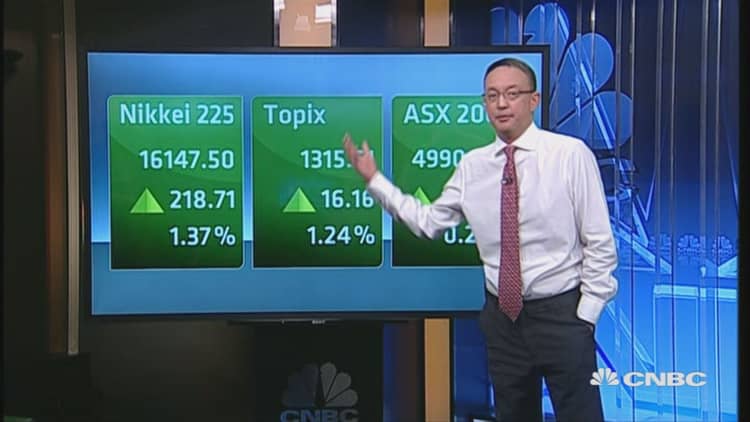
Asia markets closed higher on Wednesday, after a rise in oil prices powered gains in U.S. equities overnight and China trade data, released this morning, showed exports climbed in March.
Australia's ASX 200 added 79.05 points, or 1.59 percent, to 5,054.70, boosted by advances in the heavily-weighted financials subindex, up 1.84 percent. The energy and materials subindexes were also up 2.57 and 3.35 percent respectively.
Chinese mainland markets also advanced, with the closing up 43.54 points, or 1.44 percent, at 3,067.19, and the Shenzhen composite ending higher by 26.82 points, or 1.38 percent, at 1,962.43. In Hong Kong, the advanced 3.19 percent, or 654.27 points, to 21,158.71.
In Japan, the finished higher by 452.43 points, or 2.84 percent, at 16,381.22, buoyed by relative weakness in the yen against the dollar. The dollar/yen pair traded at 108.81 as of 3:25 p.m. HK/SIN time, advancing from 108.53 in the previous session.
Markets in South Korea and Thailand are closed today.
Major Japanese exporters closed mostly higher, with shares of Toyota up 2.52 percent, Nissan rising 3.39 percent and Honda adding 2.68 percent. Shares of Sony declined 0.4 percent.
A weaker yen is a positive for exporters as it increases their overseas profits when converted into local currency.
Stephen Innes, a senior foreign exchange trader at OANDA, said in a note that the recent slowdown in yen appreciation is not too unexpected. "Airwaves [are] running thick with intervention chatter and event risk premiums are skyrocketing, as traders debate what's next for the Bank of Japan (BOJ)," he said.
But analysts had doubts over whether the rally in Japan stocks and the yen's retreat would sustain.
Innes said the Japanese central bank needs to step up their game, but added, "given the market's apparent lack of confidence in any BOJ policy, market price momentum continues to favor a move to 105 as the overwhelming percentage of traders continue to advocate dollar/yen from the short side."
Similarly, Adrian Mowat, managing director and chief Asian and emerging market equity strategist at J.P. Morgan, highlighted that the Nikkei is moving in an inverse direction to the yen, which is leading to one dimensional trade, where a weak yen boosts stocks, and a strong yen weighs on them.
"It's not a sustainable trade," Mowat told CNBC's "Squawk Box." He added that there's only so much a central bank can do in an environment where "we have had a degree of Kurodanomics, with very little Abenomics, in terms of underlying reforms."
Abenomics refers to Prime Minister Shinzo Abe's plan for kickstarting economic growth in Japan's long-moribund economy. Many of Abe's economic reform plans have been stalled, but BOJ Governor Haruhiko Kuroda has launched multiple rounds of monetary easing measures.
Helping to support the regional market rally on Wednesday was a rebound in China's trade data, which Chris Weston, chief market strategist at IG, said in an afternoon note was "another thorn in the China bears' side."
Data released by China's General Administration of Customs showed the country's dollar-denominated exports for March increased 11.5 percent on-year, compared with a Reuters poll forecasting a 2.5 percent increase. The dollar-denominated imports for the same month fell 7.6 percent on-year, compared with the 10.2 percent drop forecast in a poll, reported Reuters.
The data also showed China's import of commodities increased on-month, which will likely boost commodity prices. In March, China imported 85.77 million tonnes of iron ore, up 16.5 percent from February; coal imports were at 19.69 million tonnes in March, up 45.4 percent from February; copper imports rose 35.7 percent on-month to 570,000 tonnes in March, reported Reuters.
Mining stocks have been broadly positive during Asia hours, with Australia miners advancing on the back of higher base metal prices overnight. Shares of major miners Rio Tinto, Fortescue and BHP Billiton advanced between 4.52 and 7.77 percent.
Three month copper prices on the London Metal Exchange rose 2.2 percent overnight, aluminum climbed 1.7 percent and zinc advanced 4 percent, initially supported by a relatively softer dollar, according to Reuters.
Iron ore prices advanced more than 4.6 percent, climbing from $55.90 on Monday to $58.50 overnight.
Chinese metal plays also advanced, with shares of Baoshan Steel gaining 0.17 percent, Yunnan Copper higher by 7.33 percent and Aluminium Corp. adding 2.42 percent.
In company news, shares of Nomura reversed losses of over 1 percent to close up 1.62 percent. In the previous session, shares climbed 7.43 percent after reports during market hours on Tuesday said the Japanese bank will restructure its business in Europe and the Americas, closing some operations in Europe.
The Australian dollar retreated from as high as $0.7715 following the release of the Chinese trade data to around $0.7655 in the evening local time. The Australian dollar was fetching around $0.7680 before the data release. China is a key export market for Australia's resources.
Overnight, the Aussie had gotten a boost from around $0.7660 in Asia trade Tuesday, with analysts attributing the rise to higher oil prices and improvement in risk appetite.
Oil prices retreated during Asian hours, after advancing more than 4 percent overnight. Global benchmark Brent futures were down 1.03 percent at $44.23 a barrel, while U.S. crude fell 1.52 percent to $41.53 as of 3:43 p.m. HK/SIN time.
Energy plays in Asia mostly shrugged off the retreat in oil prices and traded higher, with Santos advancing 4.33 percent, Woodside Petroleum up 2.99 percent and Inpex up 3.94 percent. Mainland Chinese energy stocks were mostly higher, with China Petroleum advancing 2.63 percent.
Major U.S. indexes closed up overnight, with the adding 0.94 percent, the S&P 500 up 0.97 percent and the higher by 0.8 percent.





